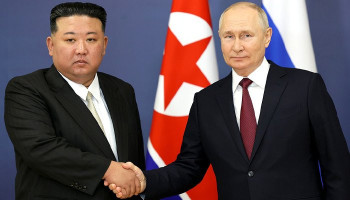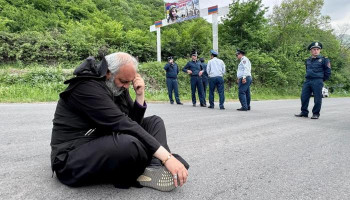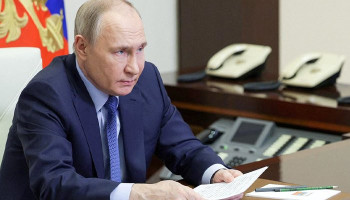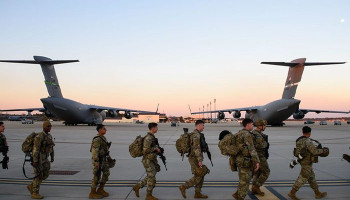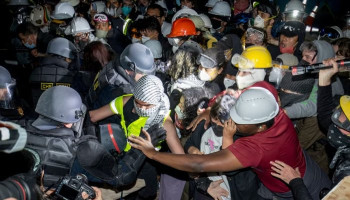U.S. Backs Off Hard Line on Syrian President’s Future
 The Obama administration entered a crucial round of international talks on Syria’s war prepared to accept a deal that leaves President Bashar al-Assad in place for several months or more during the transition to a new government. The U.S. shift on the dictator’s future caps months of backtracking on the most significant obstacle to a resolution of the Syrian conflict. While U.S. officials once argued Mr. Assad couldn’t take part in a political transition, they have gradually eased that stance, eventually signaling he wouldn’t have to step down immediately. Now they are planning to negotiate the question of his future in talks being held Friday in Vienna. The White House hasn’t publicly set a time frame for Mr. Assad’s departure to give U.S. negotiators room to maneuver in the Vienna talks, officials said. But in advance of negotiations, administration officials discussed a resolution with U.S. allies, including Turkey, that would allow Mr. Assad to remain in place after a cease-fire in the 4½-year conflict. The resolution the U.S. is seeking would include a cease-fire and would “not prejudge the Assad question,” a senior administration official said. The approach reflects new realities imposed in Syria by Russia and Iran, which have intensified military operations to bolster Mr. Assad. It also follows recent challenges faced by the American-led fight against Islamic State. Russia and Iran are taking part in Friday’s conference, along with Mr. Assad’s Arab adversaries. In all, the meeting brings together more than a dozen European and Middle Eastern foreign ministers. The inclusion of Iran represents a change after the U.S. and Saudi Arabia blocked Tehran’s participation previously. Russia and Iran have demanded Mr. Assad retain power. America’s Arab allies are demanding a clear timeline for when Mr. Assad would step down, U.S. and Arab officials said. Secretary of State John Kerry, who arrived in Vienna on Thursday, intensified discussions in recent weeks with Mr. Assad’s biggest opponents, including Saudi Arabia, Turkey and Qatar, to try to gain their support for a diplomatic resolution that would allow the Syrian dictator to stay in power during a transition, these officials said. The U.S. wields limited influence on the battlefield, making it critical for Washington to persuade those three countries and others to join in the effort because of the power they exercise over the rebel groups they support. Administration officials say they don’t expect any breakthroughs in the talks on Friday but hope for an agreement on holding additional meetings. White House press secretary Josh Earnest on Thursday said the outcome depends on the positions taken by Russia and Iran. “It’s unlikely that it will be clear right away, whether or not they’re willing to use that influence to hasten this political transition,” he said. “The position of the United States has not changed. And that is simply that President Assad has lost legitimacy to lead Syria and he should go.” The inclusion of Iran in the negotiations has prompted administration officials to express some optimism that an agreement could be reached. National Security Adviser Susan Rice said this week that there is potential for an agreement on a political transition in Damascus that “begins perhaps with Assad still in power, but it doesn’t end with him in power.” On Thursday, Thomas Shannon, President Barack Obama’s nominee to be undersecretary of state, said Mr. Kerry is seeking to ascertain whether Russia and Iran are prepared “to convince Mr. Assad that during a political transition process, he will have to go.” During his confirmation hearing, Mr. Shannon said Mr. Kerry “thought it was time to bring everybody together and effectively call their bluff.” The U.S. diplomacy is placing the Arab states and Turkey in a bind, as many of them have provided significant arms and funding to the largely Sunni rebel forces seeking to overthrow Mr. Assad. Saudi Arabia, in particular, has publicly criticized Russia’s military intervention in Syria, arguing it could strengthen Mr. Assad and Shiite-dominated Iran, his closest Middle East ally. Still, Saudi Arabia is finding it difficult to oppose the new round of diplomacy because of Russian President Vladimir Putin’s heavy military investment in Syria. Saudi officials have been holding their own direct talks with the Kremlin and have also pressed for a clear time line for when Mr. Assad would be forced to stand down, senior Arab officials said. Mr. Obama’s position in the early days of Syria’s civil war was that Mr. Assad had to step down immediately as part of any resolution to the conflict, but that position shifted as the regime held together and the spread of Islamic State has become a higher priority. The administration’s primary aim now is to get warring parties to abide by a cease-fire, so the U.S. can more effectively zero in on Islamic State and give new momentum to the stalled fight. As a result, the administration’s view is Mr. Assad’s future can be dealt with later. Current and former U.S. officials say the White House’s acceptance of Russian and Iranian demands on keeping Mr. Assad in power at least temporarily will make it hard—if not impossible— for the administration to get the different rebel factions fighting the regime to sign on to a cease-fire. But officials say getting even a limited number of rebel groups at first to agree to a cease-fire could help put pressure on others to go along with the deal or risk being targeted alongside Islamic State and Nusra Front, Syria’s al Qaeda affiliate. A linchpin of the Obama administration’s strategy in Syria has been to put enough military pressure on Mr. Assad to persuade him and those around him to negotiate a settlement to the conflict. This year, U.S. officials said they thought Mr. Assad was finally feeling that pressure as rebel groups, some backed by the Central Intelligence Agency, closed in on regime strongholds. But they say the Russian and Iranian intervention in Syria in recent weeks threw Mr. Assad a lifeline, at least for the time being, challenging U.S. assumptions about how long he can retain power. The administration hopes to convince Moscow that it made a mistake by intervening militarily in Syria and that it needs to look for a diplomatic off ramp as soon as possible before Russian casualties start to mount. But officials said it is unclear how long it will take for Moscow to feel enough pressure to look for an exit. |











